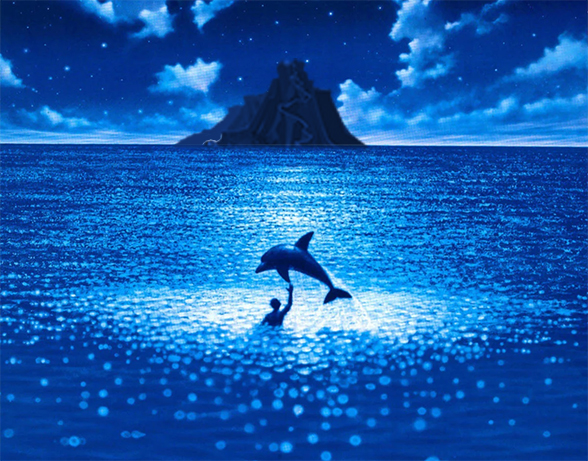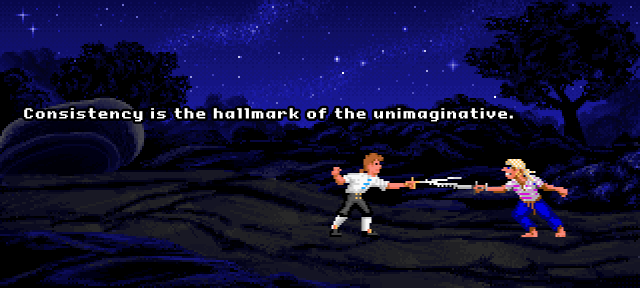Articles

“Return to Monkey Island,” First Thoughts Is Return to Monkey Island the first legacyquel in video games?
Nicolas Deneschau, author of Les mystères de Monkey Island: A l’abordage des pirates!, shares his thoughts about the cultural impact of and around Return to Monkey Island.
The incredible, unexpected, and almost unimaginable announcement of a new entry in the mythical Monkey Island saga was greeted with a bout of contagious joy and jubilation that probably exceeded even the expectations of Ron Gilbert and his army of veterans. An army that is one of the most notable gatherings of game developers, representing the glories of yesteryear, from an era when LucasArts still was associated with creativity, humor, and impertinence. In these troubled times, when the world is emerging from a pandemic and when a war has been raging in Europe for just over a month, it is an apprehensive but genuine patch of blue sky that has opened up for a whole generation of gamers. Gamers in their forties, nostalgic at the announcement of a game whose development, paradoxically, began during a pandemic. There is an excitement seen in younger gamers—or simply those less familiar with what Monkey Island represents in video game history—now curious about a game that could excite these old boomers so much. A game from an obscure developer with the self-appointed title of "grumpy gamer."
If Monkey Island unambiguously represents a milestone in the long history of adventure games; if it made it possible to put Ron Gilbert's game design theories into practice; and if it dug a rut that engulfed a whole generation of point-and-click and other adventure games, it is still quite complicated to simply explain the exceptional posterity of these titles. It is difficult to explain the impact of two simple games (developed respectively between 1989 and 1991) and to gauge their emotional impact on each player. This fracture between a nostalgic group who dreamed of returning to Monkey Island and one curious about this nascent hype has, without a doubt, planted the seed for Ron Gilbert and his team to return to the world of Guybrush Threepwood.
The original creator of Monkey Island has long expressed his interest in delivering a sequel to LeChuck's Revenge, notably in a blog post from April 2013: "If I made another Monkey Island […] It would be a retro game that harkened back to Monkey Island 1 and 2. I'd do it as' enhanced low-res'. […] I would want the game to be how we all remember Monkey Island. […] It would be an adventure game for the hardcore. You're going to get stuck. You're going to be frustrated. Some puzzles will be hard, but all the puzzles will be fair. It's one aspect of Monkey Island I am very proud of. […] Nice big juicy icons full of pixels. The first version of Monkey Island 1 had text for inventory, a later release and Monkey Island 2 had huge inventory icons and it was nirvana. They will be so nice you'll want to lick them. [… ] The only way I would or could make another Monkey Island is if I owned the IP. I've spent too much of my life creating and making things other people own. […] It would be called Monkey Island 3a. All the games after Monkey Island 2 don't exist in my Monkey Island universe. My apologies to the all talented people who worked on them and the people who loved them, but I'd want to pick up where I left off. Free of baggage. In a carnival." But, now, in 2022, nine years later, it seems that Ron Gilbert's only "dying" wish that has lived on is: "The game would be the game I wanted to make. I don't want the pressure of trying to make the game you want me to make. I would vanish for long periods of time. I would not constantly keep you up-to-date or be feeding the hype-machine."
Because, surprisingly, when the world learned the short teaser of less than a minute, the most identifiable character was Murray, the sardonic demonic skull created by… Larry Ahern and Johnathan Ackley for Curse of Monkey Island… and a few moments later, Ron Gilbert surprised the most erudite of the fans by announcing via Twitter: "MI3 doesn't go out of canon. We were very careful about that. Murray is in the game". There is a lot to unpack from this laconic tweet. First, Return to Monkey Island is not (no longer) the game that Ron Gilbert imagined in 2013—the use of "we" implies a more collective and thoughtful approach than what he considered in 2013. It is indisputable today that much of this note of intent became the basis for Thimbleweed Park, a retro game in pixels, without huge departures from the game design philosophy of LucasFilm Games/LucasArts.
But now, despite its title, Return to Monkey Island seems to take a completely different direction—you have probably noticed that there is no number in this entry. Neither MI3 nor MI6, just the promise of a return. And Ron Gilbert even had to add an addendum on the same page of his blog: "Now that Return To Monkey Island has been announced, it's important to note that a lot of my views (but not all) in this post have changed. Don't take anything in here as more than a historical moment. Quoting anything in here as canon will just led to tears." So what happened?
Legacyquel™

I imagine that in 2022, no one failed to notice that the return of old glories from the 80s/90s was literally flooding our screens. Ghostbusters, Jurassic Park, The Matrix, Star Wars, Indiana Jones, Halloween, Star Trek, Scream… The list goes on. These films face difficult challenges: balancing the heritage of films that had reached cult status and living up to the impossible promise of giving the viewer the same feeling they felt when they discovered the originals. The other challenge is to both satisfy both old fans and viewers from a new generation. This generation, which has not known the grace of the original era, looks with curiosity and incomprehension at the excitement generated by the return of these old glories. Because if there is indeed an interest in reviving a cult film, it is, of course, to be able to offer new emotions to the old, but also to conquer a new audience and, possibly, relaunch a franchise to a new base (and of course to generate mountains of dollars). Author and critic Matt Singer has come up with a name for this cinematic phenomenon that has literally defined the last ten years of blockbusters: the legacyquel. What a difficult task! Starting over while offering a sequel, modernizing the core of the original without betraying it, updating the symbolism, the rhythm, or even the visual…
And curiously, video games have, until 2022, seemed to sail on the fringes of this mythical "revolution." Of course, there are tons of sequels, remakes, reboots, and remasters, but there are very few Legacyquels in the strict sense of the word. While Doom (2016, Id Software) is a significant revamp of the original game, it is not strictly a sequel to the lore of the 90s mythos. So, is Return to Monkey Island the first-ever official video game Legacyquel™?
The "synopsis" of Return to Monkey Island places the game exactly where Monkey Island 2: LeChuck's Revenge left off. But already, certain elements in the teaser raise questions. Murray is well identifiable from the third entry, which, at least, will be considered canon of the story. But then will Stan be absent, stuck in his coffin? Will Elaine be present when she is supposed to fight LeChuck? How do you squeeze the plot of a new episode between two games that were already following each other narratively? No need to speculate; we can trust the tortured brains of Ron Gilbert and Dave Grossman to concoct all the surprises we could imagine. However, what is conceivable is that Return to Monkey Island is as much an invitation to return to these lands as a new experience for those who discover the series for the first time. Because it may be that Return to Monkey Island was imagined as a little of both: one which could be savored on its own, and at the same time—why not?—invite new players to then return to the first games.
The original artistic direction of Return to Monkey Island, directed by the talented Rex Crowle, is directly in line with the long tradition of the series' changing styles: Steve Purcell, Peter Chan, Bill Tiller, Chris Miles, Derek Sakai, and so many others… It contrasts radically with this wave of retro games' pixel art, like with Thimbleweed Park. There is likely an intention behind this change that is obvious from the very first seconds of the teaser. Exit nostalgia and make way for renewal. Monkey Island is getting a makeover. By juggling heritage (Michael Land, Clint Bajakian, and Peter McConnell are back!) while having a foot firmly rooted in our time, Return to Monkey Island tries purposefully and with a lot of courage to build something new. (While many players just wanted a remaster of Curse of Monkey Island… what a lack of ambition).
By experience, we already know that a legacyquel translates concretely into several different incarnations. There is, for example, the "soft reboot," which is a false remake in the disguise of a sequel (Star Wars 7, Jurassic World…). In this case, Return to Monkey Island could use that particular narrative structure, the first part with multiple objectives on Mêlée then a second on Monkey Island. The stakes would be similar, becoming a pirate again, rescuing Elaine but ultimately realizing that Guybrush is too late.
Then there is the "legacyquel structure" (Matrix 4, Scream…), which will knowingly play on its sequel status and take a step back and try a resolutely post-modern approach. There was already a bit of this spirit in the first entry of Monkey Island by intentionally breaking the fourth wall, which could be an exciting direction.
Finally, there could be the nostalgic deluge: this is one of the traps in which many sequels fall that they forget their own personality by pandering to fans. Drowned in references, winks, and easter eggs, this kind of sequels ultimately has no soul. The tropes of Monkey Island are famous: insult and spitting contests, sword fights, cult lines, ridiculous situations… But let's hope that Return to Monkey Island will be able to avoid them as much as possible.
Since 2013, Ron Gilbert has had time to think about what he could do with a hypothetical sequel. And since 2013, Jurassic Park, Star Wars, The Matrix, etc., have had time to cut their teeth there. It is very likely that our grumpy gamer has, therefore, completely re-imagined what he could offer to veteran or novice players so that Monkey Island is once again a source of wonder and, why not, a little more than a simple and humble continuation. In any case, the result will undoubtedly be exciting. The stakes and the pressure on Return to Monkey Island and its developers are of enormous stature. The destiny of this game is not only to generate a new generation of fans but, perhaps, to once again redefine what adventure gaming could be for the next few years. But above all, Return to Monkey Island is a small island in the middle of an ocean of Star Wars games and, therefore, an unprecedented move by neo-LucasFilm. Commercial success and critical success of the game can result in a new wave of adventure games for our pleasure. And if all this turns out to be wrong when the game is released… well, that's okay, that's the game we got.